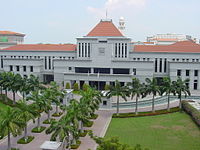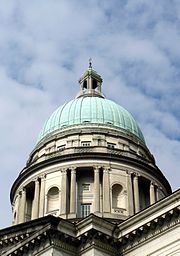- Constitution of Singapore
-
Singapore 
This article is part of the series:
Politics and government of
SingaporeConstitution
- President: Tony Tan Keng Yam
- Government
- Prime Minister: Lee Hsien Loong
- Cabinet
- Government organisations
- Judicial system
- Chief Justice: Chan Sek Keong
- Supreme Court
(Court of Appeal and High Court) - Subordinate Courts
The Constitution of Singapore is the supreme law of Singapore [1] and it is a codified constitution.
The constitution cannot be amended without the support of more than two-thirds of the members of parliament on the second and third readings [2]. The president may seek opinion on constitutional issues from a tribunal consisting of not fewer than three judges of the Supreme Court. Singaporean courts, like the courts in Australia, cannot offer advisory opinions on the constitutionality of laws [3].
Contents
Parts of the Constitution
The Constitution of Singapore consists of the following 14 parts[4]:
- Preliminary
- The Republic and the Constitution
- Protection of the sovereignty of the Republic of Singapore
- Fundamental liberties
- The Government
- The Legislature
- The Presidential Council for Minority Rights
- The Judiciary
- The Public Service
- Citizenship
- Financial Provisions
- Special powers against subversion and emergency powers
- General provisions
- Transitional provisions
Fundamental liberties
Part IV of the constitution guarantees the following[5]:
- liberty of a person
- prohibition of slavery and forced labour
- protection against retrospective criminal laws and repeated trials
- equal protection
- prohibition of banishment and freedom of movement
- freedom of speech, assembly and association
- freedom of religion
- right to education
Part XII of the constitution allows the Parliament of Singapore to enact legislation designed to stop or prevent subversion. Such legislation is valid even if it is inconsistent with Part IV of the constitution.
History timeline
- 1946, following the end of the Japanese Occupation of Singapore, the Straits Settlements was dissolved and Singapore became a separate Crown Colony. A new Colonial Constitution was passed.
- 1955, the Rendel Constitution, originally proposed in 1953, came into effect. It gave the local population more power to determine the government but the colonial administration still held most of the authority over internal matters.
- 1958, after Lim Yew Hock's successful negotiation with the British government, the British Parliament passed a State of Singapore Act and Singapore's status was changed from a colony to a state. The Singapore (Constitution) Order-in-Council was enacted and it created the position of a Yang di-Pertuan Negara as the constitutional head of state, a prime minister and a 51-elected member Legislative Assembly.
- 1963, Singapore joined the Federation of Malaysia. The Sabah, Sarawak and Singapore (State Constitutions) Order-in-Council was enacted.
- 1965, Singapore was separated from Malaysia, effected by three documents: The Constitution of Malaysia (Singapore Amendment) Act, the Constitution of Singapore (Amendment) Act and the Republic of Singapore Independence Act of 1965.
- 1970, to safeguard the rights of the racial, linguistic and religious minorities, the Presidential Council was established and later renamed the Presidential Council for Minority Rights in 1973.
- 1984, a constitutional amendment was passed to provide for non-constituency members of Parliament.
- 1988, a constitutional amendment was passed to introduce group representation constituencies (GRCs). At least one member of the GRC must be from a minority race.
- 1988, the constitution was amended to provide for nominated members of Parliament.
- 1991, the constitution was amended to provide for a popularly elected president.
Notes
- ^ "Constitution of the Republic of Singapore". Attorney-General's Chambers of Singapore website. http://statutes.agc.gov.sg/non_version/cgi-bin/cgi_retrieve.pl?actno=REVED-CONST&doctitle=CONSTITUTION%20OF%20THE%20REPUBLIC%20OF%20SINGAPORE%0a&date=latest&method=part&sl=1. Retrieved September 16, 2008.
- ^ "Fundamental Liberties". Attorney-General's Chambers of Singapore website. http://statutes.agc.gov.sg/non_version/cgi-bin/cgi_getdata.pl?actno=1999-REVED-CONST&doctitle=CONSTITUTION%20OF%20THE%20REPUBLIC%20OF%20SINGAPORE%0a&date=latest&method=part&segid=931158659-000271#931158659-000271. Retrieved January 29, 2005.
- ^ "The Republic and the Constitution". Attorney-General's Chambers of Singapore website. http://statutes.agc.gov.sg/non_version/cgi-bin/cgi_getdata.pl?actno=1999-REVED-CONST&doctitle=CONSTITUTION%20OF%20THE%20REPUBLIC%20OF%20SINGAPORE%0a&date=latest&method=part&segid=931158659-000167#931158659-000174. Retrieved January 29, 2005.
- ^ "The Republic and the Constitution". Attorney-General's Chambers of Singapore website. http://statutes.agc.gov.sg/non_version/cgi-bin/cgi_getdata.pl?actno=1999-REVED-CONST&doctitle=CONSTITUTION%20OF%20THE%20REPUBLIC%20OF%20SINGAPORE%0a&date=latest&method=part&segid=931158659-000167#931158659-000178. Retrieved January 29, 2005.
- ^ "The Judiciary". Attorney-General's Chambers of Singapore website. http://statutes.agc.gov.sg/non_version/cgi-bin/cgi_getdata.pl?actno=1999-REVED-CONST&doctitle=CONSTITUTION%20OF%20THE%20REPUBLIC%20OF%20SINGAPORE%0a&date=latest&method=part&segid=931158660-002294#931158660-002388. Retrieved January 29, 2005.
Further reading
- Sheridan, L.A. (Lionel Astor) (ed.), with special contributors (1961). Malaya and Singapore, the Borneo Territories: The Development of Its Laws and Constitution. London: Stevens.
- Tan, Kevin Y.L. (Yew Lee) (ed.) (2005). Essays in Singapore Legal History. Singapore: Singapore Academy of Law; Marshall Cavendish Academic. ISBN 981-210-349-X (pbk.). ISBN 981-210-389-9 (hbk.).
- Tan, Kevin Y.L. (Yew Lee); Thio Li-ann (1997). Tan, Yeo & Lee's Constitutional Law in Malaysia and Singapore (2nd ed. ed.). Singapore: Butterworths Asia. ISBN 0-409-99908-3 (pbk.).
- Tan, Kevin Y.L. (Yew Lee) (ed.) (1999). The Singapore Legal System (2nd ed. ed.). Singapore: Singapore University Press. ISBN 9971-69-213-9 (pbk.). ISBN 9971-69-212-0 (hbk.).
Constitutions of Asia Sovereign
states- Afghanistan
- Armenia
- Azerbaijan
- Bahrain
- Bangladesh
- Bhutan
- Brunei
- Burma (Myanmar)
- Cambodia
- People's Republic of China
- Cyprus
- East Timor (Timor-Leste)
- Egypt
- Georgia
- India
- Indonesia
- Iran
- Iraq
- Israel
- Japan
- Jordan
- Kazakhstan
- North Korea
- South Korea
- Kuwait
- Kyrgyzstan
- Laos
- Lebanon
- Malaysia
- Maldives
- Mongolia
- Nepal
- Oman
- Pakistan
- Philippines
- Qatar
- Russia
- Saudi Arabia
- Singapore
- Sri Lanka
- Syria
- Tajikistan
- Thailand
- Turkey
- Turkmenistan
- United Arab Emirates
- Uzbekistan
- Vietnam
- Yemen
States with limited
recognitionDependencies and
other territories- Christmas Island
- Cocos (Keeling) Islands
- Hong Kong
- Macau
Law of Singapore Constitutional law Executive branch: Government • President • Cabinet • Prime Minister • Attorney-General
Legislative branch: President • Parliament
Judicial branch: Judicial system • Judicial independence • Judicial officers • Constitution of the Republic of Singapore Tribunal • Supreme Court (Court of Appeal and High Court) • Subordinate Courts
Constitution: Constitution of Singapore • Elections • Human rights • Internal Security Act • Presidential Council for Minority Rights • Singaporean nationality law
Administrative law Bias • Legitimate expectation • Wednesbury unreasonablenessCivil procedure Electronic Filing System • Integrated Electronic Litigation SystemCriminal law Family law Categories:- Constitutional law of Singapore
- Constitutions by country
- Singaporean legislation
Wikimedia Foundation. 2010.
